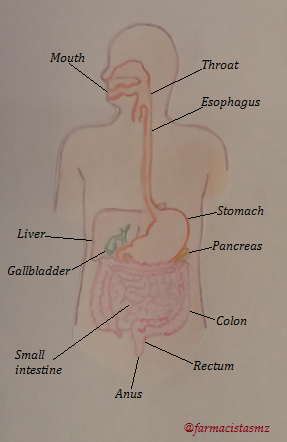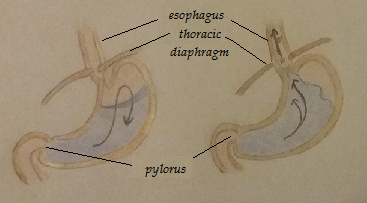The role of stress in digestive disorders: effects and remedies

The problem arises when this becomes overwhelmingly prevalent and continued over time, causing multiple harmful effects on our body. In this post I want to introduce some of the effects caused by anxiety and stress on our body, in the case of today's post on the digestive system.
First, a brief summary of the organs from which this apparatus is composed and the respective functions:

• The mouth, in which a first digestion takes place through the chewing of food, turning it into a bolus. The salivary glands secrete the saliva which facilitates this mechanical process, moisten the bolus to facilitate its swallowing and through an α-amylase enzyme (ptialine) cleaves the α-1,4 bonds of the glucides.
• Esophagus, is a fibromuscular tube that through the peristaltic contractions pushes the bolus from the pharynx towards the stomach.
• Stomach is an abdominal organ located between the esophagus and the small intestine, whose walls in the innermost layer contain cells capable of secreting substances (such as gastric acid, gastrin, pepsinogen and mucus) and allow the digestion of food received in it.
• Small intestine (which in turn is divided into duodenum, jejunum and ileum)
• Colon (divided into ascending, transverse and descending)
• Rectum or the terminal part of the intestine
The most frequent are those involving the mouth (aches or small, very annoying lesions), the stomach (with a sensation of acidity commonly called gastritis, nausea, pain) or the intestine, but also in the colon (with colitis or irritable colon ), but also vomiting, diarrhea due to undigested food in the intestine or constipation. Gastritis often affects people who are very emotional and subject to heavy stress.
Adequate time management between hectic work and rest, and techniques for managing strong emotions can be of great help in psychosomatic reactions.
• Aloe vera is a very well known plant, used for many diseases, among which the one in which we are interested in this case, because it favors the cicatrization and the re-epithelization of the lesions. Usually, the gel in its fresh leaves which are cut and squeezed, is used fot treatment.
The Aloe gel, being rich in mucilage, creates a protective "film" on the lesion, facilitating healing and reducing the painful sensation. Aloe can also be applied to irritated and sore gums.
• Decoction of mallow flowers applied on the lesion or using it to rinse.
• A cotton swab soaked in Mother Tincture of Calendula Officinalis, diluted 30% in physiological solution, is an excellent remedy for canker sores, but also for other oral infections.
• Propolis is an antiseptic, healing, resinous substance (it contains a good quantity of vitamin C, which promotes the formation of collagen) and protects it to be applied on the mucosa.
• Tea Tree oil or (Melaleuca Alternifolia) for its antiseptic and antibacterial action, is used to perform touches on the aphas or in the case of Herpes on the bladders to accelerate healing. It is not recommended to swallow Tea Tree Oil, unless it is indicated on the label which is 100% pure. In this case we can take it, as long as it is conveyed for example with honey (maximum two drops of oil in a spoonful of honey) after the meal, for the treatment of bacterial or viral infections that cause fever, bronchitis or candidiasis.
• Altea root decoction is used to make rinses. The Altea is a plant rich in mucilage, flavonoids and tannins and consequently with anti-inflammatory properties, it can also be applied in the case of gingivitis.
• Diet corrections are of great importance, especially in the case of severe stress periods, during which it is recommended to avoid drinking coffee (at least not exceeding 1/2 cups a day). In addition, to support the immune system we must take food (seasonal vegetables and fruit, white meat, fish and yogurt) containing vitamins (especially vitamin C), mineral salts and proteins to facilitate healing.
Another home remedy that we can apply is lemon juice, despite the burning that you will feel applying it, it is a valuable ally to combat canker sores, herpes or blisters. The juice can be used diluted to make rinses, or you can apply a few drops of lemon on the affected part, twice a day.
Now, we continue the descent along the digestive system to talk about gastroesophageal reflux, gastritis and ulcers.

• Acute - when induced by the ingestion of substances such as certain types of foods or alcohol, but also some classes of medicines (NSAIDs)
• Chronic - functional alterations caused by a strong and persistent state of emotional stress, but in some cases also by a Helicobacter Pilori infection (gram negative bacterium present in many patients with chronic gastritis).
Excessive use of NSAIDs (non-steroidal anti-inflammatory drugs) such as Aspirin, Ibrurofen or Naproxen, may cause the onset of acute gastritis over time, but in severe cases, even chronic, going to attack the internal mucosa of the stomach. The same problem of irritation and corrosion of the gastric mucosa, occurs in the case of abuse of alcohol and other substances.
Gastritis can develop, especially in the elderly, also due to an autoimmune disease, in which the immune system attacks healthy cells or due to a reflux of bile, caused by a malfunctioning of the valve that prevents it from coming back from the intestine (where it has the function of digesting fats) in the stomach irritating the walls.
Another cause not to be underestimated is stress, which can lead to a nervous gastritis, which can be aggravated by the ingestion of drugs, spicy foods or drinks like coffee.
The symptoms of gastritis may vary depending on the cases and situations, but among the most common we have:
• Reduction of appetite or sense of full stomach after a meal
• Gastric reflux
• Weight loss
• Nausea
• Heartburn or a dull ache in the upper part of the abdomen, related to food intake or not
Peptic ulceration takes on different names depending on its location:
• Gastric ulcer, when it is present at the stomach level
• Duodenal ulcer, when it develops in the duodenum
• Esophageal ulcer, when it hits the esophagus, often caused by the chronic acid reflux
The ulcer should not be confused with gastritis! If left untreated, gastritis may evolve from an inflammation of the stomach to an ulceration.
Antacids - are weak bases or salts that are intended to buffer the acid pH, without altering the secretory mechanisms.
- Sodium bicarbonate (NaHCO3), an effective remedy in occasional, but short-lived events. Not recommended in hypertensive patients, as in contact with the acid, bicarbonate free CO2 (carbon dioxide, causing abdominal swelling.
- Calcium carbonate (CaCO3)
- Aluminum Hydroxide Al(OH)3· H2O
- Magnesium Hydroxide Mg(OH)2
Alginate - like Sodium Alginate, a polymer extracted from some types of brown algae, also used in the food industry as a thickener classified with code E402. Used both in the treatment of acid reflux, but also for the protection of the mucous membranes of the stomach.
Other drugs, both for self-medication but also to be taken after medical prescription, are the antisecretives:
Proton pump inhibitor drugs, the enzyme hydrogen-potassium adenosintrifosfatase (H+ / K +- ATPase) whose activity allows the release of hydrochloric acid from the parietal cells of the stomach. Thus, these drugs are intended to reduce the production of gastric acid, generally they must be taken for a period of about 4 weeks
- Esomeprazole
- Lansoprazole
- Omeprazole
- Pantoprazole
- Rabeprazole
H2 receptor antagonists for histidine, whose effect is the inhibition of acid secretion in the stomach
- Cimetidine
- Famotidine
- Nizatidine
- Ranitidine - is one of the most used drugs, also to alleviate the irritative symptoms caused by drugs such as NSAIDs
If the symptoms of gastritis or reflux are not present for a long time, in addition to assessing what we can change in our lifestyle, we can resort to natural remedies. Especially during the periods of high stress, during which we can use some phytotherapics that have calming, antispasmodic and muco-protective properties.
Aloe Vera, Altea, Mallow and Icelandic Lichen - rich in mucilage soothe the gastric mucosa
Chamomile, lemon balm or linden - thanks to their calming properties help reduce stress
Ginger and Licorice - have anti-inflammatory, digestive and aromatic properties, promote and improve digestion. Licorice is not recommended in cases of hypertension and renal insufficiency
Lactic ferments - keeping the intestinal bacterial flora healthy and balanced can help us to fight gastric problems
Note: the images were created by @farmacistasmz
wow. This is thoroughly researched and enlightening
Thank you! :)